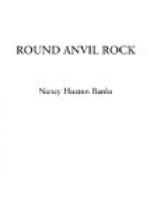On the part of Paul Colbert, the feeling was wholly different, and largely impersonal. It was merely the dislike that every busy man feels for a new acquaintance which promises no interest, even at the outset. Had he been less busy, and his mind more free, he might perhaps have found some amusement in trying to find out how far this serious young man was mistaken in his high estimate of himself. He thought at a first glance that he was a good deal in error, but he also saw that he was sincere in his conviction; so that the young doctor was tolerantly amused at the lofty air of the young lawyer, without the slightest feeling of real resentment. He made one or two straightforward, friendly efforts to thaw the ice of William Pressley’s manner. His own was naturally frank and cordial. He always wished to be liked, which is the natural wish of every truly kind nature. And then, above and beyond this, was the right-minded lover’s instinctive desire to secure the good-will of all who are near the one whom he loves; for Paul Colbert had fallen in love with Ruth, and he knew it, as few do who have fallen in love at first sight. He could, indeed, have told the very instant at which love had come—like a bolt from the blue.
He was therefore more than willing to be friendly with William Pressley, and already seeking a pretext to come again. He now said, turning to Ruth with a smile:
“Since you are fond of poetry, perhaps you will allow me to fetch you a new volume of poems by a young Englishman, Lord Byron. A friend sent it to me from London. He says it is being severely treated by the critics. They say that they never would have believed that any one could have been as idle and as worthless generally, as those ‘Hours of Idleness’ prove the author to be. But I think you will like the poems, especially one called ‘The Tear.’ It is said that the poet means to write something about Daniel Boone.”
“There should be many tears in that poem,” said Ruth, a shadow falling over the brightness of her face. “To think of the poor old hero as he is now makes the heart ache.”
“It should make us all ashamed,” said Paul Colbert. “He gave us the whole state, and we are not willing to give him back enough of it to rest his failing feet upon, nor a log cabin to shelter his feeble body, worn out in our service. It is the blackest ingratitude. It is a disgrace to the commonwealth.”
“Pardon me,” said William Pressley, with his cool smile; “but as I look at the matter, there is no one but himself to blame. It is solely the result of his own negligence and ignorance. He did not observe the plain requirement of the law.”
“But, William,” said Ruth, impulsively, with a brighter color in her cheek, “just think! How could he know—a simple old hunter, just like a little child, only as brave as a lion!” There was a quiver in her voice and a flash in her soft eyes.
“We can but hope that the state will remember what it owes,” said the doctor, moving toward the door.




